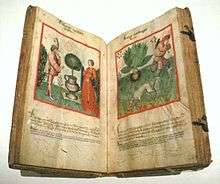Ibn Butlan

Ibn Butlan (Arabic: ابن بطلان; 1038,[1] 1075) was an Arab Nestorian Christian physician who was active in Baghdad during the Islamic Golden Age.
He wrote the Taqwim al-Sihhah (The Maintenance of Health).[2] The work treated matters of hygiene, dietetics, and exercise. It emphasized the benefits of regular attention to the personal physical and mental well-being. The continued popularity and publication of this medieval text of Middle Eastern origin into the sixteenth century is thought to demonstrate the influence that Arabic culture had on early modern Europe.[1][3] One of his Greek sources was Dioscorides.[4]
Books
1. Al-taghvim al-seha'at 2.Da'avat al-ateba' 3.Al-maghalat al-Mokhtarat fi tadbir al-amraz al-a'rezat al-aksar bel taghziat Ma'loofat 4.Resalat fi shari al-raghigh va taghlib al-bai'd 5.Maghalat fi an al-foroj ahar men al-farkh 6.Al-maghalat al-mesriat fi monaghezat ali ebne rezvan 7.Maghal fi al-gorban al-moghadas[5]
References
- 1 2 Ibn Butlan's Tacuinum sanitatis in medicina. Strassburg, 1531.
- ↑ Forbes, Andrew ; Henley, Daniel; Henley, David (2013). 'Abu'l Hasan Ibn Butlan' in: Health and Well Being: A Medieval Guide. Chiang Mai: Cognoscenti Books. ASIN:B00DQ5BKFA
- ↑ Loudon, Irvine (2002-03-07). Western Medicine: An Illustrated History. Oxford University Press. ISBN 9780199248131. Retrieved 5 September 2012.
- ↑ "On Plants". World Digital Library. Retrieved 17 June 2013.
- ↑ http://www.tandorostan.org
| Wikimedia Commons has media related to Tacuina sanitatis. |
External links
- Arnaldez, R. (2008) [1970-80]. "Ibn Buṭlān, Abuʾl-Ḥasan Al-Mukhtār Ibn ʿAbdūn Ibn SaʿDūn". Complete Dictionary of Scientific Biography. Encyclopedia.com.